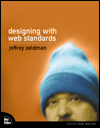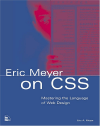0305
Jason Fried completely missed the point of my post, which was to illustrate the silliness of rants like:
There's way too much talk about CSS and XHTML and Standards and Accessibility...
and
All I could hear was CSS CSS CSS.
with satirical rants in kind.
Perhaps I should have simply asked what's wrong with people showing that they sufficiently absorbed some of the presentations they had attended, enough to reiterate and discuss afterwards in the hallways?
No matter. Jason took the opportunity in his response to make a few points, albeit misquoting me in the process. I'll try to avoid doing the same.
First regarding the book promotion issue: I'm glad (though a bit surprised) that Jason was asked to promote his book due to the booksigning. However, other presentations were also asked by the conference coordinators to announce upcoming book signings, which no one else AFAIK interpreted as an encouragement to go beyond simple announcements and turn into a promotion.
Next, I pointed out with rhetorical questions that XHTML+CSS is in general more accessible than PDF. It really wasn't a fair comparison, since PDF is unfit for human consumption. But somehow Jason misinterpreted my comparison as implying something else:
all that matters in making a presentation accessible is to make sure it's in CSS+XHTML.
Here's what I actually said:
We need good design and valid, efficient, accessible markup and styling.
Accessibility starts with good design and valid, efficient, accessible markup and styling.
It certainly doesn't end there, as anyone who has read the W3C Web Content Accessibility Guidelines could relate.
On the other hand, PDF is a step backwards in accessibility, since more often than not, it traps content in a static format unadaptable by user preferences / style sheets etc. with the exception of an awkward zoom function. Sometimes I wonder if the PDF viewer was designed to turn all of its users into scrollbar-jockeys, since the content never seems to reasonably fit or flow into a window.
Jason proceeds to setup a few strawmen:
What if I want to print it out?
Use a print style sheet. E.g.
<style media="print" type="text/css">
...
</style>
Have you ever tried to print out an entire site or a 50-page HTML-based presentation?
This works just fine when all 50 pages are in the same HTML file, styled to look like slides when you're viewing them on the screen, and printed pages when you're printing.
Or, what if I want to view the presentation offline? Say on a plane? Viewing an HTML-based presentation offline can be a real hassle (most people have no idea how to "get" a multi-paged HTML-based presentation off the web and view it locally).
See above. This too works just fine with a multi-page HTML file, especially with an inline style sheet or two.
These capabilities aren't XHTML+CSS rocket science. And yet, even this short series of rhetorical questions with straightforward answers illustrates the point that perhaps a better understanding of the tools is a good thing to acquire and discuss.
I agree with the definition of accessibility that Jason points to, however he sets up another strawman and again misses the point that although valid XHTML+CSS may not be the end all be all, it is certainly more accessible than PDF.
I won't bother iterating through all the refutations of Jason's twisting of the definition of accessibility because the commenters in his post have already adequately addressed it.
The one thing I will point out is that when someone uses language like:
... the majority of people might want ...
It's usually a pretty good indicator that they've completely missed the point of accessibility, which is to focus on making things accessible to often neglected minorities.
Jason says he didn't present in XHTML because he used Keynote, which begs the question:
Why doesn't Keynote support XHTML+CSS? Fundamentally, typical presentations are just outlines, structured text, styled with a few images and special effects. Speaking of which...
I can certainly appreciate the entertainment value of subtle transitions and visual effects
, and sound effects too. Hence I too used a presentation program (PowerPoint) for a light-hearted "Top Ten List" intro to the "CSS: the Good, the Bad, and the Ugly" session.
And yet, as Tufte has pointed out, the tool shapes the content, which applies as much to the new Apple Keynote as it did to the old Aldus Persuasion and the current PowerPoint.
Which begs the question, are there presentations that would NOT benefit from hypertext? Jason seems to think so:
The SxSW presentation I [Jason] gave had no web links or web-dependencies so HTML was not appropriate in that context.
This is a (perhaps common?) misconception that needs to be corrected.
Any presentation can be made more semantic (i.e. meaningful and useful) by hyperlinking key concepts, acronyms, terms, abbreviations etc.
Any presentation that uses examples from the Web can benefit by linking those examples to either live URLs from whence they came, or perhaps to archive.org versions.
Any presentation which builds upon the works of others, with citations or quotations can certainly benefit from hyperlinks to those references.
Any presentation which discusses a good book to purchase on the subject can be made better by hyperlinking that book to its convenient 'click to buy now' Amazon page.
As Jason said, I could go on and on with other examples but the differences are clear: pickled, static, and proprietary vs. hyperlinked, adaptable, and open.
Which do you think provides a better foundation for accessible and usable content?
 people
people












Comments